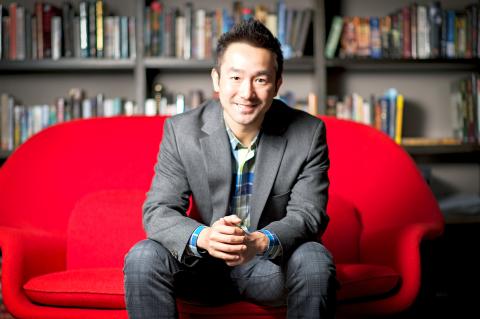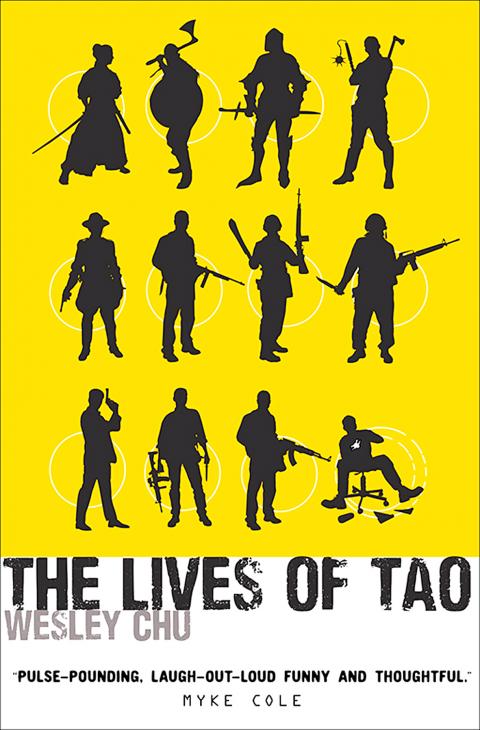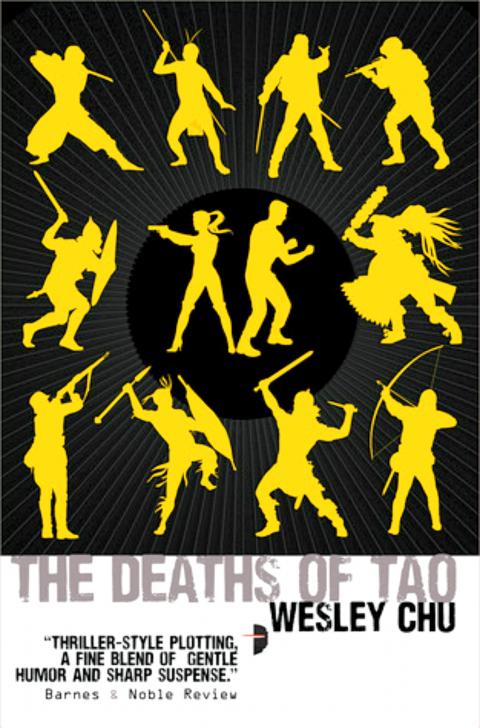It’s 11pm in Taipei but 10am in Chicago, where the award-winning author Wesley Chu (朱恆昱) is as usual in his “cave,” looking a little frayed around the edges. It’s not just the bathrobe, which has been ripped at the elbow by his dog. Handsome enough to have modeled and been cast in minor Hollywood movie roles, Chu has bed hair, a full beard and that dazed look of someone who has just woken up — or worked all night.
Framed by groaning bookshelves and sitting in his comfy chair, it would appear that the life of a science fiction writer is about letting go, being free to imagine time-bending scenarios and characters that crisscross the universe in search of derring-do. But it’s not quite that simple.
We have been emailing back and forth for weeks and after text messaging on Google Hangouts we agree to a “face-to-face” interview. If it was the 20th century, this would not be happening. In fact, it would be thought of as science fiction.

Photo courtesy of Wesley Chu
Born in mid-1970s Taipei, Chu was initially brought up in Chiayi by his grandparents because his father was studying in the US. He recalls the convenience store his grandfather owned, a chicken coop, an out-house and “biting the nose of the principal’s son because he took my toy.” At the tender age of five he joined his parents in Nebraska, but still considers himself Taiwanese, and Taiwanese-American.
Fast forward to the tail end of the 1990s and Chu had graduated from the University of Illinois with a degree in management information systems. He would go on to work as a consultant and software engineer before joining Bank of America and becoming an associate vice president.
Comfortable. Yes. Successful. Yes. But it wasn’t the life Chu wanted. In fact, he hated it. His original plan was to be a writer but his father dissuaded him, worried he would “suffer” financially as an artist. The filial son suspects that even now his father would prefer that he was working at JPMorgan rather than on fiction. Odd for an English professor to think this, you might say, but entirely in character for a “Tiger Dad.”

Photo courtesy of Wesley Chu
To get the ball rolling during our face-to-face, I point out the obvious and ask: “It really is true then that authors roll around in a bathrobe all day and essentially think great thoughts?”
“Yes, it’s fantastic. Going to work is a walk of 40 steps,” Chu says.
“Well, those 40 steps can be a challenge, I’m sure, but don’t you miss the cut and thrust of cubicle politics, the rustle of spreadsheets and the endless meetings?” I ask.

Photo courtesy of Wesley Chu
“Not one red second. It’s a different politics now, there’s publishing politics. If anything, it’s sometimes worse,” Chu says.
“You’re dealing with people who are very close to their work. In business and corporations, at least in business it’s just business. In publishing, especially for the writers, their books are like children,” he adds.
Chu is technically a SFF (science fiction and fantasy) author, and a “high concept” or “big idea” writer, meaning he comes up with plausible alternate realities, particularly those in which some kind of compelling innovation has taken place. His characters are strong and full of personality. They clash, strive and evolve according to how events play out in the novel.
His prose has a cinematic style, meaning while reading you can imagine how it would play in the movie theater. He is quite insistent that his writing style is natural rather than the result of having one eye on a big payday, saying, “It’s just the way my voice comes out.”
He’s also rather modest about his English skills, claiming his wife will divorce him if she has to do another editing job for him. Another plus is he has a globalized outlook, incorporating Asian concepts and geographical locations in his novels. His second book, The Deaths of Tao takes place in Taipei and Kaohsiung.
His literary coming out party was The Lives of Tao, which I read as having a Buddhist worldview, but Chu puts me straight on that one: “I didn’t have Asian spiritualism in mind when I was world-building the novel. I was actually more focused on writing a very personal story that reflected what I was going through at the time. The Lives of Tao, in essence, is a coming-of-age story.”
The protagonist works a dead-end job, has low self esteem and in the end finds purpose in life. While that may sound familiar, the alien that inhabits the protagonist and helps him become the person he wants to be, is of course, pure fiction. The Lives of Tao won an Alex Award and spawned a trilogy, which isn’t a bad start to a literary career.
“I’ve won a few awards,” he says. “Nothing really changes. You get a bump in sales for sure but other than that, you keep on writing. Even making the New York Times bestseller list doesn’t change your life.”
For me, his second book, Time Salvager, the first installment of another planned trilogy, is more cogent, muscular and confident. It’s set 400 years in the future and the hero is a jaundiced, addicted individual whose job is to go back in time, steal energy and not get caught. It’s strong enough to have been optioned by Paramount, with Michael Bay slated to direct.
Chu’s books have been translated into Russian, German, Hebrew and Hungarian, while Time Salvager will be published by Nautilus in Taiwan and People’s Literature in China. He says he would “love to work with Asian filmmakers on a film/television adaptation.”
Some people don’t think about the future and are not interested in books on this subject. But a grounded reality and history is also important to Chu, and it’s what makes his stories appealing.
“If you think about it, 400 years ago, we weren’t even in the steam age yet. It was horses, swords and wooden ships,” he says.
“If you bring someone from the 17th century to the present, they would probably swear we’re wielding magic. Technology advances at a curve. We’ve had more advancements in the past 50 years than in the past 500.”
As I might have intimated, Chu is really understated — from his bed hair down to the four bathrobes he wears out in a year. He claims to do nothing but write in his “cave” and occasionally get walked by his dog. He doesn’t mention his acting, modeling, nerd credentials, business and banking experience, the fact he’s a gymnast and martial artist, though he does note that “just this year, I went to Tanzania in Africa to summit Kilimanjaro.”
If the boy in Chiayi could see his future life with all the compelling innovations that have taken place, I guess it would look a bit like the science fiction/urban fantasy Chu writes.
1 OH 1, can refer to Taipei 101; an introductory course or analysis; One uh One, a spare male at a party, or a useless person — always male; there are about 1.01 men for every 1 woman, thus, every one hundred and first male is not going to find a partner-; a one-on-one interview

We lay transfixed under our blankets as the silhouettes of manta rays temporarily eclipsed the moon above us, and flickers of shadow at our feet revealed smaller fish darting in and out of the shelter of the sunken ship. Unwilling to close our eyes against this magnificent spectacle, we continued to watch, oohing and aahing, until the darkness and the exhaustion of the day’s events finally caught up with us and we fell into a deep slumber. Falling asleep under 1.5 million gallons of seawater in relative comfort was undoubtedly the highlight of the weekend, but the rest of the tour

Youngdoung Tenzin is living history of modern Tibet. The Chinese government on Dec. 22 last year sanctioned him along with 19 other Canadians who were associated with the Canada Tibet Committee and the Uighur Rights Advocacy Project. A former political chair of the Canadian Tibetan Association of Ontario and community outreach manager for the Canada Tibet Committee, he is now a lecturer and researcher in Environmental Chemistry at the University of Toronto. “I was born into a nomadic Tibetan family in Tibet,” he says. “I came to India in 1999, when I was 11. I even met [His Holiness] the 14th the Dalai

Following the rollercoaster ride of 2025, next year is already shaping up to be dramatic. The ongoing constitutional crises and the nine-in-one local elections are already dominating the landscape. The constitutional crises are the ones to lose sleep over. Though much business is still being conducted, crucial items such as next year’s budget, civil servant pensions and the proposed eight-year NT$1.25 trillion (approx US$40 billion) special defense budget are still being contested. There are, however, two glimmers of hope. One is that the legally contested move by five of the eight grand justices on the Constitutional Court’s ad hoc move

Stepping off the busy through-road at Yongan Market Station, lights flashing, horns honking, I turn down a small side street and into the warm embrace of my favorite hole-in-the-wall gem, the Hoi An Banh Mi shop (越南會安麵包), red flags and yellow lanterns waving outside. “Little sister, we were wondering where you’ve been, we haven’t seen you in ages!” the owners call out with a smile. It’s been seven days. The restaurant is run by Huang Jin-chuan (黃錦泉), who is married to a local, and her little sister Eva, who helps out on weekends, having also moved to New Taipei